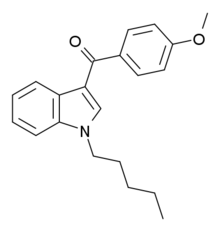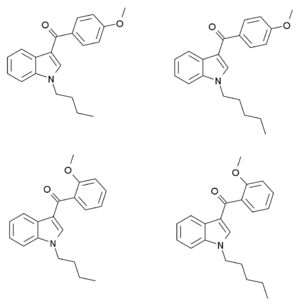RCS-4
 | |
|---|---|
| Systematic (IUPAC) name | |
| 2-(4-methoxyphenyl)-1-(1-pentyl-indol-3-yl)methanone | |
| Clinical data | |
| Legal status | Illegal in Sweden, I-N (Poland)[1] |
| Identifiers | |
| CAS number | 1345966-78-0 |
| ATC code | ? |
| ChemSpider | 24769418 |
| Chemical data | |
| Formula | C21H23NO2 |
| Mol. mass | 321.413 |
| SMILES
| |
| |
| | |
RCS-4, or 1-pentyl-3-(4-methoxybenzoyl)indole, is a synthetic cannabinoid drug sold under the names SR-19, BTM-4, or Eric-4 (later shortened to E-4), but originally, OBT-199.
Legality
RCS-4 was banned in Sweden on 1 October 2010 as a hazardous good harmful to health, after being identified as an ingredient in "herbal" synthetic cannabis products.[2][3] It was outlawed in Denmark on 11 March 2011.[4] In August 2011, New Zealand added not only RCS-4 but also its 1-butyl homologue, and the 2-methoxybenzoyl isomers of both these compounds, to a temporary class drug schedule (i.e. equivalent to Class C but reviewed after 12 months, and with personal possession and use of small amounts decriminalised), which was newly created under the Misuse of Drugs Amendment Act 2011 passed a week earlier.[5][6][7]

See also
- AM-630
- AM-679
- RCS-8
- Pravadoline (WIN 48,098)
References
- ↑ = WDU20111050614 "Ustawa z dnia 15 kwietnia 2011 r. o zmianie ustawy o przeciwdziałaniu narkomanii ( Dz.U. 2011 nr 105 poz. 614 )". Internetowy System Aktów Prawnych. Retrieved 12 June 2011.
- ↑ Swedish Code of Statutes Regulation (2010:1086).
- ↑ Swedish Code of Statutes Regulation (2010:1086). (pdf)
- ↑ http://laegemiddelstyrelsen.dk/~/media/AC4F04EB48F74523A76BA84DAB9B6067.ashx
- ↑ "Kronic ban passed by Parliament". The New Zealand Herald. NZPA. 4 August 2011. Retrieved 4 November 2011.
- ↑ "Synthetic cannabis off shelves by Wednesday". The New Zealand Herald. NZPA. 9 August 2011. Retrieved 4 November 2011.
- ↑ New Zealand Gazette. Tuesday 9 August 2011. Issue No 122, pp 3365-3366. Departmental Notices. Health. Misuse of Drugs Act 1975. Temporary Class Drug Notice.